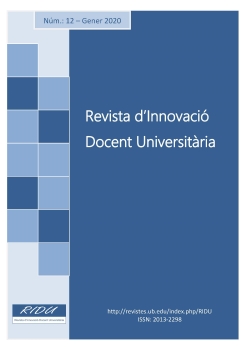(Auto) biographical reflection and deconstruction in the context of the teaching-learning process developed in the course Role and Identity in Social Work
DOI:
https://doi.org/10.1344/RIDU2020.12.1Keywords:
Autobiography, Epistemological deconstruction, Social Work, Autonomous learning, Collaborative learningAbstract
In the following paper we present the teaching-learning experience developed in the fourth year of the degree in Social Work in the compulsory course Role and Identity in Social Work. From the pedagogical point of view, we invite our students to reflect on their own learning process through the deconstruction of their autobiography. We focus on methodologies that promote and encourage a heterarchical learning process between students and teachers based on the respect for academic knowledge and everyday life. We believe that in the current social and educational context, teachers have the challenge to open pedagogical possibilities to other formats of transmission of knowledge in the teaching of Social Work, thus encouraging and stimulating student participation (as proactive subjects), complex thinking, transformative action and the transdisciplinarity of knowledge.
This proposal is also part of a teaching innovation project that aims to reorient the transmission of knowledge based on narrative strategies. The incorporation of this reflective approach into the project translates into a collective and co-built learning experience which involves other subjects and teachers, thus allowing us to expand the epistemological perspectives and learning expectations.
In this sense, this article aims to explain and reflect on this teaching-learning experience, and, at the same time, assess the methodology that has been used and the actions that have been carried out based on the results.References
Anderson, H. (1999) Conversación, lenguaje y posibilidades :un enfoque postmoderno de la terapia. Biblioteca de psicología y psicoanálisis. Amorrortu, Buenos Aires.
Arendt, H. (2005) La condición humana. Paidós Surcos, Barcelona.
Arfuch, L. (2007) El espacio biográfico. Dilemas de la subjetividad contemporánea. (2ªed.). Fondo de Cultura Económica, Buenos Aires.
Claval, P. (1991) Els mites fundadors de les ciències socials. Herder, Barcelona.
Delors, J. (1996) Los cuatro pilares de la educación. A: La educación encierra un tesoro. Santillana/UNESCO, Madrid
Denzin, N. (1989) Interpretive Biography. Sage Publications, London.
Foucault, M., Frost, E.C. (1968). Las Palabras y las cosas: una arqueología de las ciencias humanas. Siglo XXI, México, D.F.
Gil Cantero, F. (1997) Educación y narrativa: la práctica de la autobiografía en la educación. Teoría de la educación, 9, pp. 115-136.
Husserl, E., Muñoz, J., Mas, S. (1990) La crisis de las ciencias europeas y la fenomenología transcendental: una introducción a la filosofía fenomenología. Crítica, Barcelona.
Marina, J.A. (2012) La inteligencia ejecutiva. Ariel, Barcelona.
Maturana, H.R. (2003) El sentido de lo humano. J.C. Saez editores, Santiago de Chile.
Morin, E. (2003) Educar en la era planetaria. Gedisa, Barcelona.
Olney, J. (1991) Algunas versiones de la memoria/Algunas versiones del bios: la ontología de la autobiografía. Anthropos, 29, pp. 33-47.
Ordine, N. (2013) La utilitat de l’inútil. Quaderns Crema, Barcelona.
Ortega y Gasset, J. 1883-1955. (1966). Historia como sistema / José Ortega y Gasset. Revista de Occidente, Madrid.
Pujadas, J.J. (1992) El Método biográfico: el uso de las historias de vida en ciencias sociales. Centro de Investigaciones Sociológicas, Madrid.
Rousseau, J.-J. (1925) Las Confesiones. Calpe, Madrid.
Vilafranca, I. (2003) Memòria, relat biogràfic i formació. Temps d’Educació, 28, pp. 13-24.
Downloads
Published
Issue
Section
License
Authors whishing to publish in this journal agree to the following conditions:
- The author or author retain copyright and grants the journal the right of first publication of the paper.
- The texts will be published under license "Reconocimiento Creative Commons 4.0 España", which allows to share, distribute, reproduce and the public communication of the paper, as long as the name of the author or authors and the journal are clearly stated.







